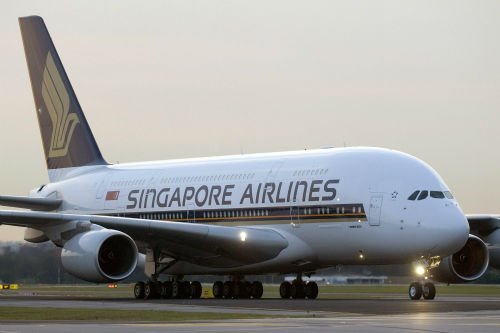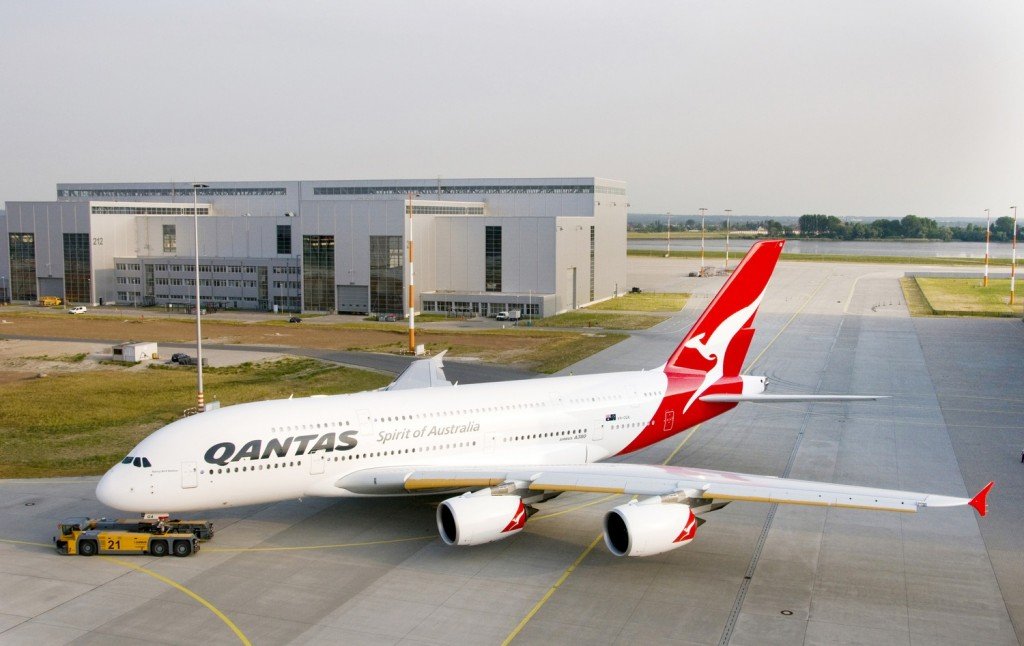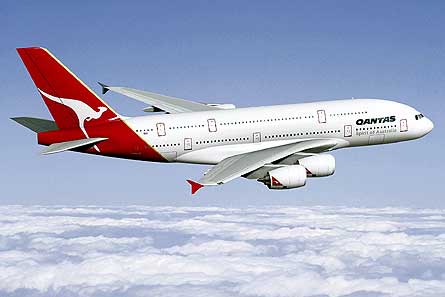Home Tags Posts tagged with "airbus a380"
airbus a380
A Singapore Airlines plane was forced to make an emergency landing in Azerbaijan due to loss of cabin pressure.
The Airbus A380 plane was flying from London to Singapore and had 467 passengers and 27 crew members on board.
Singapore Airlines said that oxygen masks were deployed and the aircraft landed “uneventfully” at the Baku airport.
It said that none of the passengers or crew was injured and that it was investigating what caused the problem.
Singapore Airlines said a replacement airplane to take the stranded passengers on to Singapore had now departed and was due to arrive in Baku on January 7.
It said it had also sent staff from both Istanbul and Moscow to provide assistance on the ground in Baku.

The Singapore Airlines plane was forced to make an emergency landing in Azerbaijan due to loss of cabin pressure
However, some customers writing on the airline’s Facebook page complained about the wait for a replacement plane.
In response to the complaints, Singapore Airlines issued a statement on Facebook apologizing: “We sincerely apologize to affected customers for the inconvenience caused by the diversion and the lengthy delay encountered at the airport in Baku.”
However, other people writing on Singapore Airline’s Facebook page praised its handling of the incident.
In response to passenger reports that the emergency landing was because of a faulty door, a Singapore Airlines spokesman said that “on the earlier flight into London there was a noise reported from one of the main deck doors”.
But he added that “the door was inspected by engineers on the ground in London with no findings, and the aircraft was cleared for continued operation”.
Airbus, which manufactures A380s, said in a statement that it was “following up on this issue and providing technical assistance to the airline”.
Singapore Airlines is one of the biggest operators of the A380 planes, with 19 jets in its fleet.
Two passengers almost came to blows at 40,000ft on board a 517-seat Airbus A380 being operated by Emirates from Dubai into Manchester Airport.
The argument started when an 18-year-old youth sitting in economy class moved his seat back to sleep.
The 38-year-old passenger sitting immediately behind him was about to eat his in-flight meal at the time.
When he asked the youth to put his seat back up while he ate a major row broke out.
They traded insults and leapt up from their seats in a head-to-head confrontation.
As the argument became more heated cabin crew were called and attempted to defuse the incident.
Stunned travelers watched on as the two men continued to shout abuse at each other while standing in the aisle before they were finally persuaded to calm down.
The pilot of flight EK17 flight was so concerned he radioed ahead and police were informed.
Officers went to the gate at Terminal 1 after the flight landed to meet the two passengers at around noon on Tuesday.
A spokesman for Greater Manchester Police confirmed officers “spoke to” two men aged 38 and 18.
No further action was taken as neither man wanted to make a formal complaint, and also admitted they had both been “in the wrong”, say police.
A spokesman for Emirates said: “Emirates does not tolerate this kind of behaviour from passengers and safety will not be compromised.”
They confirmed there had been an “altercation” on board the flight and, although no blow had been exchanged, cabin crew had been called to calm the passengers.

Two passengers almost came to blows at 40,000ft on board a 517-seat Airbus A380 being operated by Emirates from Dubai into Manchester Airport
One traveller, who uses the route, said: “I have recently flown with Emirates to the Far East. This trip was split up into 2 separate flights and lasted 20 hours.
“Like a lot of people on the second leg of the trip I wanted to sleep. There is a system in place where you can indicate that you do not want the meal and to be left alone to sleep, which is what I did. My seat was reclined to the limit allowed.
“When it came time for the meal I was woken up by the person behind asking me to sit up, so they could enjoy their meal. I was a little p***** off that I had been woken up.
“I hadn’t reclined it whilst he was eating, I was doing what I wanted to do, sleep, in a position that the seat was allowing me. I didn’t make a fuss and accepted it.
“This is only a problem in the <<cheap>> seats and perhaps the airlines can have an area in this class for passengers who want to sleep in the reclined position.
“No meals would be served to these passengers, so the problem will be removed. By sitting in this area you accept no meals and the seat in front may be reclined.”
The double-decker plane first started flying into Manchester Airport in September 2010 after around $15 million had been spent on changes to the airfield to accommodate it.
Its introduction was part of a huge boom in the number of people flying in and out of Dubai.
Australian engineers have called for Airbus A380 super-jumbo (the world’s biggest passenger aircraft) to be grounded, after Singapore Airlines and Qantas found cracks in the wings of their aircrafts.
Steve Purvinas, secretary of the Australian Licensed Aircraft Engineers Association said: “We can’t continue to gamble with people’s lives and allow those aircraft to fly around and hope that they make it until their four-yearly inspection.”
Singapore Airlines, Qantas and Airbus, admitted that they had discovered cracks, but maintained that the aircraft were safe.
In total, 67 Airbus A380s are in use worldwide, on seven airlines: Qantas, Singapore Airlines, Emirates, Air France, Lufthansa, Korean Airlines and China Southern.
“We confirm that cracks were found on non-critical wing attachments on a limited number of A380s,” an Airbus spokesperson said today.
“We’ve traced the origin of these hairline cracks, and developed an inspection and repair procedure which can be done during routine maintenance.”
Singapore Airlines, the world’s second-biggest carrier, operates fourteen A380s already and has 5 on order, while Qantas has taken delivery of ten of its order of twenty A380 aircraft.

In total, 67 Airbus A380s are in use worldwide, on seven airlines: Qantas, Singapore Airlines, Emirates, Air France, Lufthansa, Korean Airlines and China Southern
The A380 has been in service for five years. It seats 525 passengers in a typical three-class arrangement. In total, 238 of the aircraft have been ordered by 17 airlines worldwide.
The planes are assembled in Toulouse, but parts are built across Europe, with the wings being built in Broughton, Wales.
Singapore Airlines (SIA) and Qantas Airways said on Friday they discovered cracks on the wing ribs of their Airbus A380s, but said the cracks pose no threat to safety and repairs have been carried out.
The remarks came after Airbus said on Thursday that engineers discovered minor cracks in the wings of a “limited number” of A380s, but said the cracks were not affecting the safety of the aircraft.
“Cracks were found on a small number of wing rib feet on an Airbus A380 during inspections in the second half of last year. These pose no safety issue and repairs were carried out on the aircraft,” SIA’s spokesman Nicholas Ionides said in an email.
“Repairs were subsequently carried out on a second aircraft. We have kept the relevant regulatory authorities fully informed and will be carrying out inspections and any necessary repairs on other A380s as they go in for routine checks,” he added.
Qantas said that “minuscule cracking” was found in the wing ribs of the Qantas A380 being repaired in Singapore after one of its Rolls-Royce Trent 900 engines suffered a mid-air blowout in 2010.
“Investigations have found that the cracking is unrelated to the engine failure incident experienced by this aircraft in November 2010 and is not unique to Qantas. It has now been repaired,” Qantas said in a statement.
“No immediate action is required by A380 operators because the cracking presents no risk whatsoever to flight safety,” Qantas said.
A Lufthansa spokesman said: “There is no findings on our side and we have normal operations.”
Airbus said it has traced the origin of the problem and developed an inspection and repair procedure that will be done during routine, scheduled four-year maintenance checks.
Both Singapore Airlines and Qantas are using Rolls-Royce Trent 900 engines on their A380 fleets.
A London-bound Qantas A380 with 258 on board was forced to divert to Dubai after an engine problem occurred on Friday.
The incident happen one year since a mid-air engine blowout prompted the Australian airline to ground its entire fleet of Airbus superjumbos for nearly a month.
British writer and comedian Stephen Fry was on board flight 31 which landed safely on three engines and immediately began tweeting, turning the event into a social media hit but capping a nightmare week for Qantas.
“Bugger. Forced to land in Dubai. An engine has decided not to play,” Stephen Fry told his 3.3 million followers on Twitter.
“Not a great week for Qantas,” he added.
Qantas has just emerged from the grounding of its entire fleet over the weekend following a long-running labour dispute.
The weekend shutdown stranded almost 70,000 passengers, forcing the government and the nation’s labour tribunal to intervene and ban all further strikes at Qantas.

A London-bound Qantas A380 with 258 on board was forced to divert to Dubai after an engine problem occurred on Friday
Friday’s flight, with 258 people on board, had an “oil quantity defect” in one engine which was switched off according to standard procedure, a Qantas spokeswoman in Sydney said, adding Qantas engineers would investigate the problem.
Qantas said in a letter distributed to passengers and posted on Twitter by Fry that engineers would take a number of hours to conduct “mandatory inspections.”
The airline added it was rebooking the passengers on alternative carriers.
“Qantas… have said they shut down the engine to check oil and that there was no explosion,” an aviation industry source familiar with events said.
A second source with knowledge of events said Qantas identified the glitch about 90 minutes after take off.
“If it had been really serious they would have turned back and not flown on to Dubai,” the source said.
“Engine systems are so sophisticated now they can flag any discrepancy so airlines can act.”
A Qantas Airbus A380 aircraft suffered an engine explosion on November 4 last year shortly after leaving Singapore for Sydney. It returned to Singapore and landed safely.
“The two issues are completely unrelated. This is a one-off and we will look to get the aircraft back in the skies as soon as possible,” Qantas spokeswoman Olivia Wirth said on Friday.
Each Qantas A380 is powered by four Rolls Royce engines. The carrier has 10 A380s in service and is due to take delivery of two more by the year-end. It also has two more on order and deferred the delivery schedule for six others.
Stephen Fry later tweeted that he was on a flight to London with Emirates, which operates the world’s biggest fleet of A380s but powered by engines supplied by a joint venture between General Electric and Pratt & Whitney.
An analyst who wished not to be named said Stephen Fry’s Twitter feeds inflated the incident.
“This doesn’t seem like a big deal,” said the analyst.
“It seems like a precautionary measure. But the fact that it is Qantas again and on the same date as last year with Stephen Fry tweeting about it has made it a big deal.”
A Rolls Royce spokesman said the company was aware of the incident and was working closely with Qantas to provide appropriate support and technical assistance.
In last year’s engine blowout, a turbine disc disintegrated and sent supersonic shrapnel through the aircraft’s wing, severing systems and narrowly missing the cabin.
Investigations pinpointed a manufacturing fault in an oil pipe which could lead to oil leaks and ordered safety checks.
Rolls-Royce replaced or upgraded dozens of engines.
Rolls Royce engines power the A380 fleet of Qantas, Singapore Airlines, and Lufthansa and China Southern.
Airbus has sold 236 A380s. By the end of September this year it had delivered 57. The four-engined double-decker airplanes sell for $375 million (234 million pounds) each at list prices.
Qantas shares closed up 2.5% at A$1.62, in line with the broader market.
Shares in Rolls-Royce fell 1 percent to 709 pence, also in line. In Paris, shares in Airbus parent EADS lagged the rest of the market, falling 1.6% to 21.31 euros.




